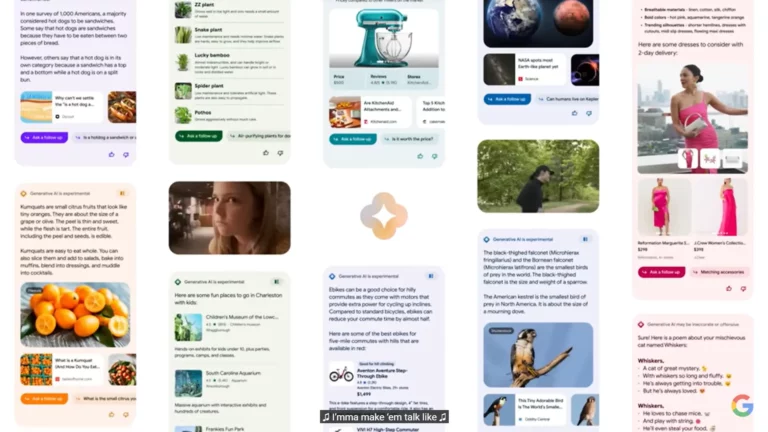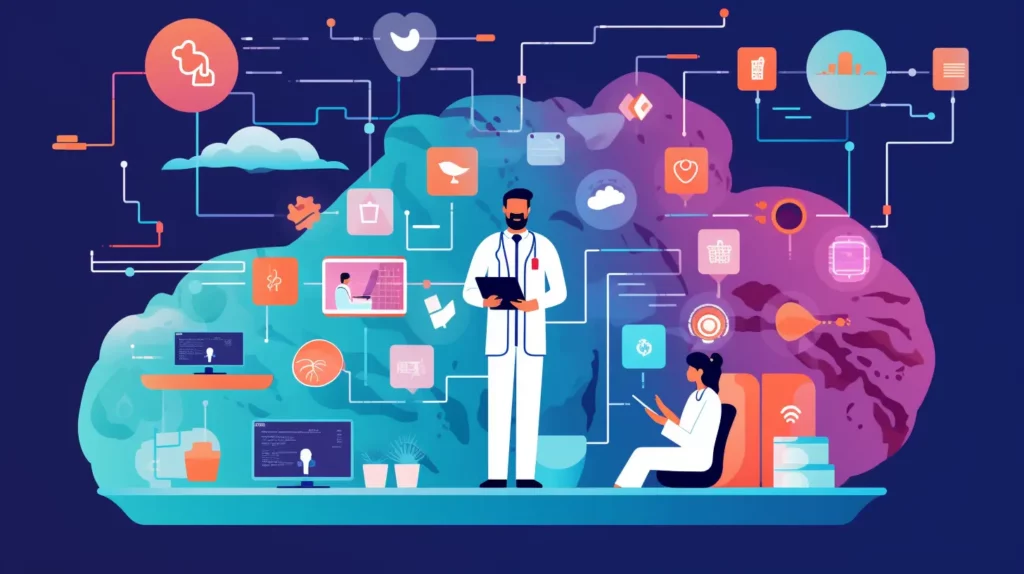Google SGE, or Search Generative Experience, is a new feature that is being added to Google Search with big implications for healthcare businesses. SGE uses Generative AI to provide users with more comprehensive and informative search results. Google Search is used by 92% of internet users worldwide, processing over 8.5 billion searches everyday, with over 1 billion searches being related to health. SGE is the biggest change to Google Search since its inception. From a healthcare context, this will have a significant impact for both patients and healthcare businesses.
What is Search Generative Experience?
SGE in Google Search’s AI makeover. A big part of the search results will now be AI generated and the familiar blue links of websites will be pushed down the page. You can watch Google’s catchy video introducing SGE below:
AI Generated Snapshots in Google SGE
So the first big change to search is the AI Generated Snapshot. Below is a screenshot of what the AI Generated Snapshot looks like:
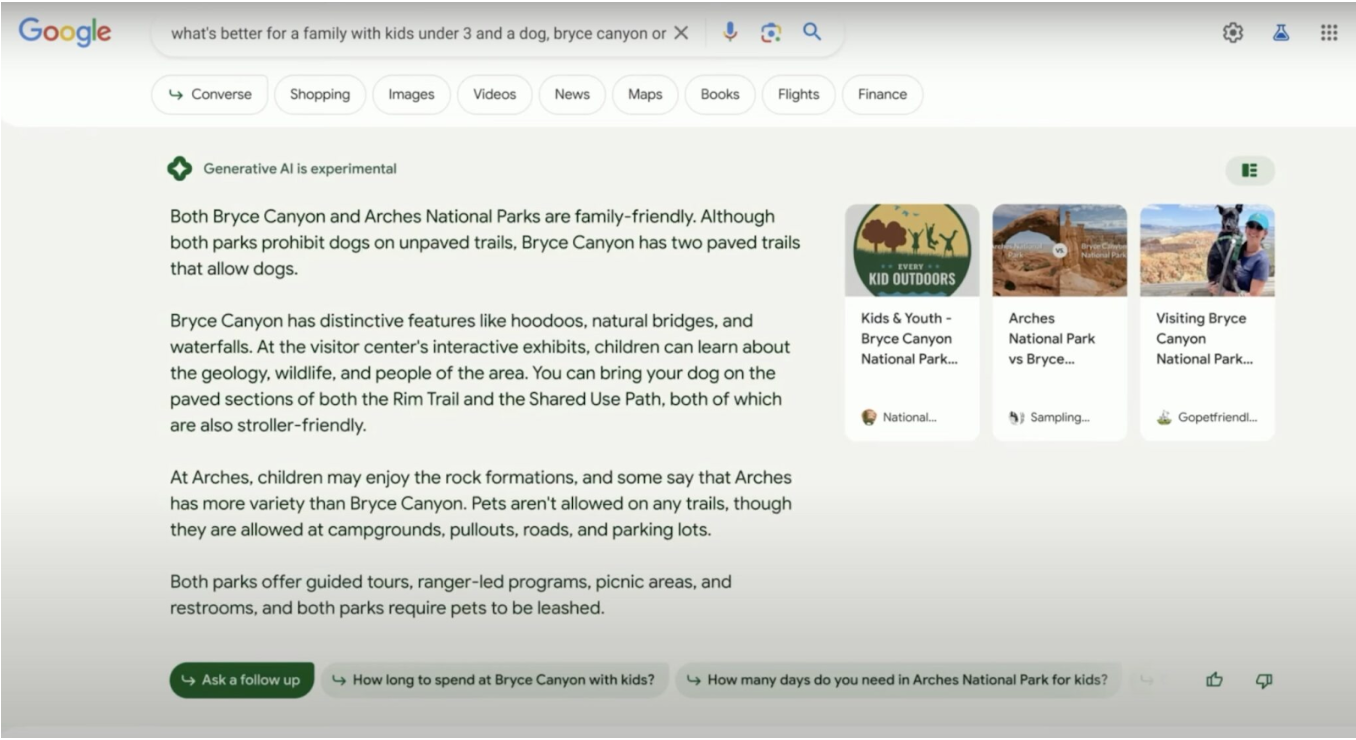
In the above example, the user has asked a long question: ‘What’s better for a family with kids under 3 and a dog, Bryce Canyon or Arches?’. Existing Google Search returns 10 links and you have to browse them and make a decision yourself. With SGE, Google now uses Generative AI to create an answer for that question and displays it. Towards the right of the generated answer it displays some links that corroborate its response. The 10 blue links are still there, but they have been pushed down to the bottom of the page.
So how does Google generate this answer? It uses Generative AI – the technology that has been at the center of the recent AI advancements. Generative AI allows humans to generate content using AI – write a blog post using ChatGPT, create an image using Midjourney or Dall-E, create music using MusicLM. Large Language Models (LLM), the technology behind generative AI, has been trained on a large corpus of content, usually scraped from the internet. It uses that to generate content that matches your input.
Conversation Mode in Google SGE
From the main search results you tap on ‘Ask me a followup’ (or other prompts) and this switches from the search mode to conversation mode. The Conversation mode gives you a ChatGPT-like chat interface where you can ask questions and get answers, exploring your topic of search in greater detail. At this point you are interacting with PaLM-2 – Google’s Large Language Model which will use its knowledge of the internet to answer your questions. The conversation mode more or less eliminates the need to visit multiple websites for information. You can just ask questions and get all the answers you need within the Google interface.
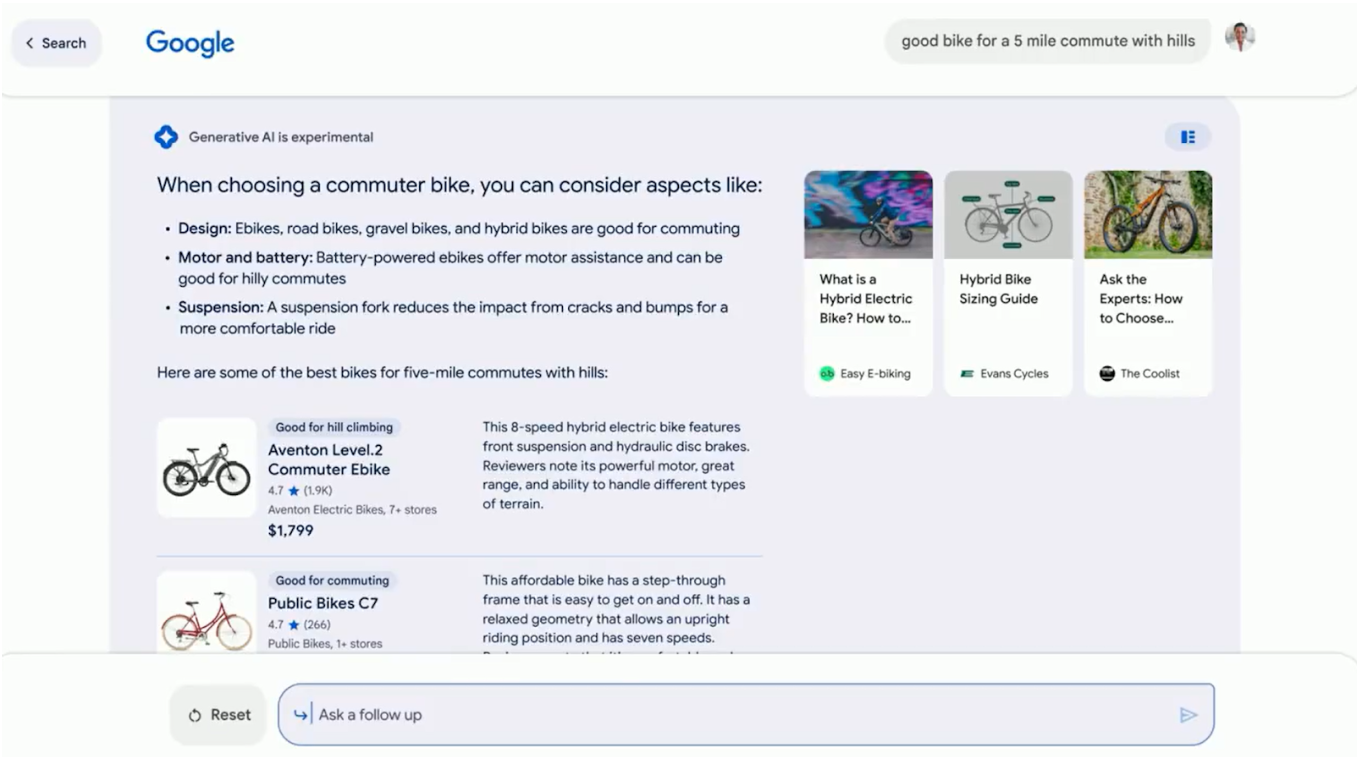
Perspectives in Google SGE
Google is also introducing a view called perspectives which shows real world experiences of other users that might be relevant to your search. So this is likely to show videos, blogs, tweets and other social media content.
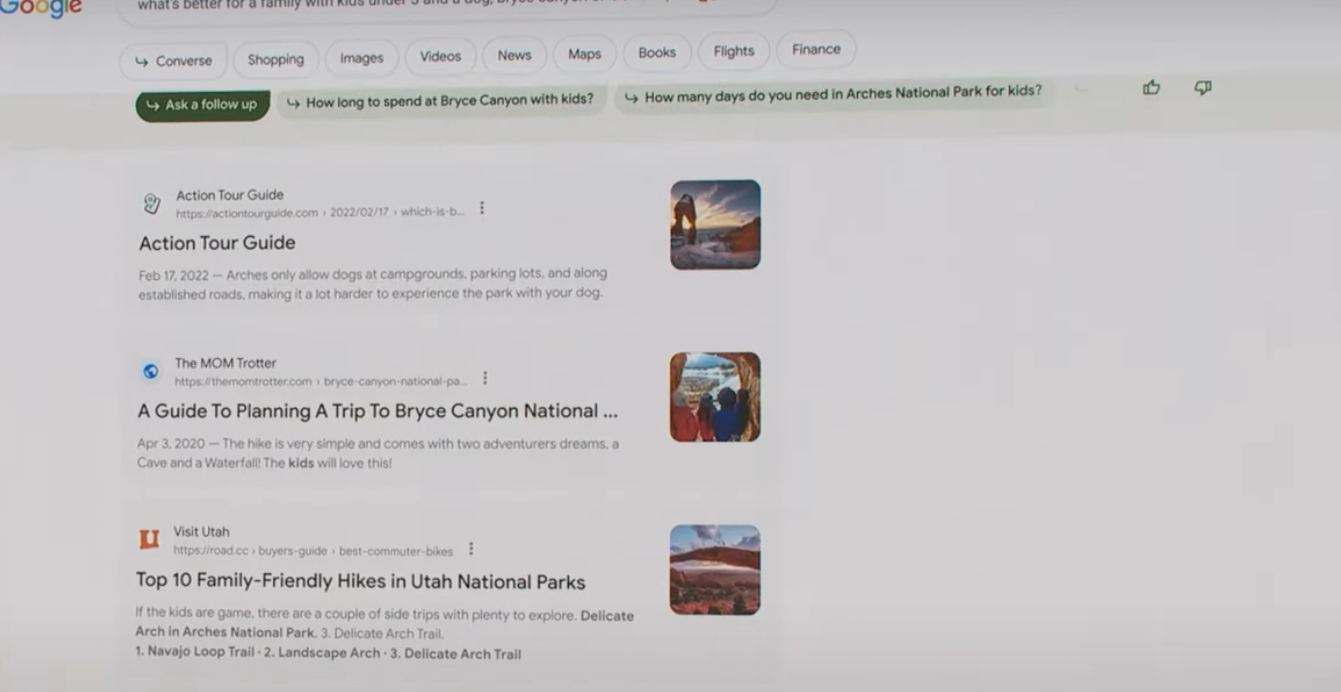
Beyond Search .. Getting Things Done
And the new Google goes beyond search and allows you to get things done. Like ChatGPT it can do all kinds of tasks:
- Analysis
- Summarization
- Planning
- Content Creation
And since Google Search has updated information on everything, it will be to take advantage of this knowledge for any of these tasks.
What Does Google SGE Mean For Healthcare Businesses?
So what do these changes mean for healthcare businesses? Since Google is a constant companion in any patient journey, you can expect the AI infusion to have a significant impact on patient behavior, which in turn has deep implications for healthcare businesses.
Patients Spend More Time On Google SGE And Less Time On Your Healthcare Website
One of the big implications of SGE, is that patients will use the generative AI capabilities of Google to answer most of their questions and visit a lesser number of websites. This potentially means that most websites could see a significant drop in visits.
Google SGE demo’s blur the concept of a search page and page ranking. So in today’s Google, if your website appears on page one for a particular highly searched term or even better in the top 3 results, then it means your business gets a lot of traffic. In the AI powered SGE, this is no longer a factor. So patient conversions will now depend on the level of exposure your business receives within SGE. Since SGE is not yet publicly available, there is not much information available on how SGE evaluates websites. Expect more information to be available as SGE rolls out to early users over the next few months.
Handling of Health Queries in Google SGE
Large Language Models now have prowess that rivals human physicians on various tasks. For example Google MedPaLM-2 has outperformed human physicians in USMLE(United States Medical Licensing Examination)-style Question Answering.
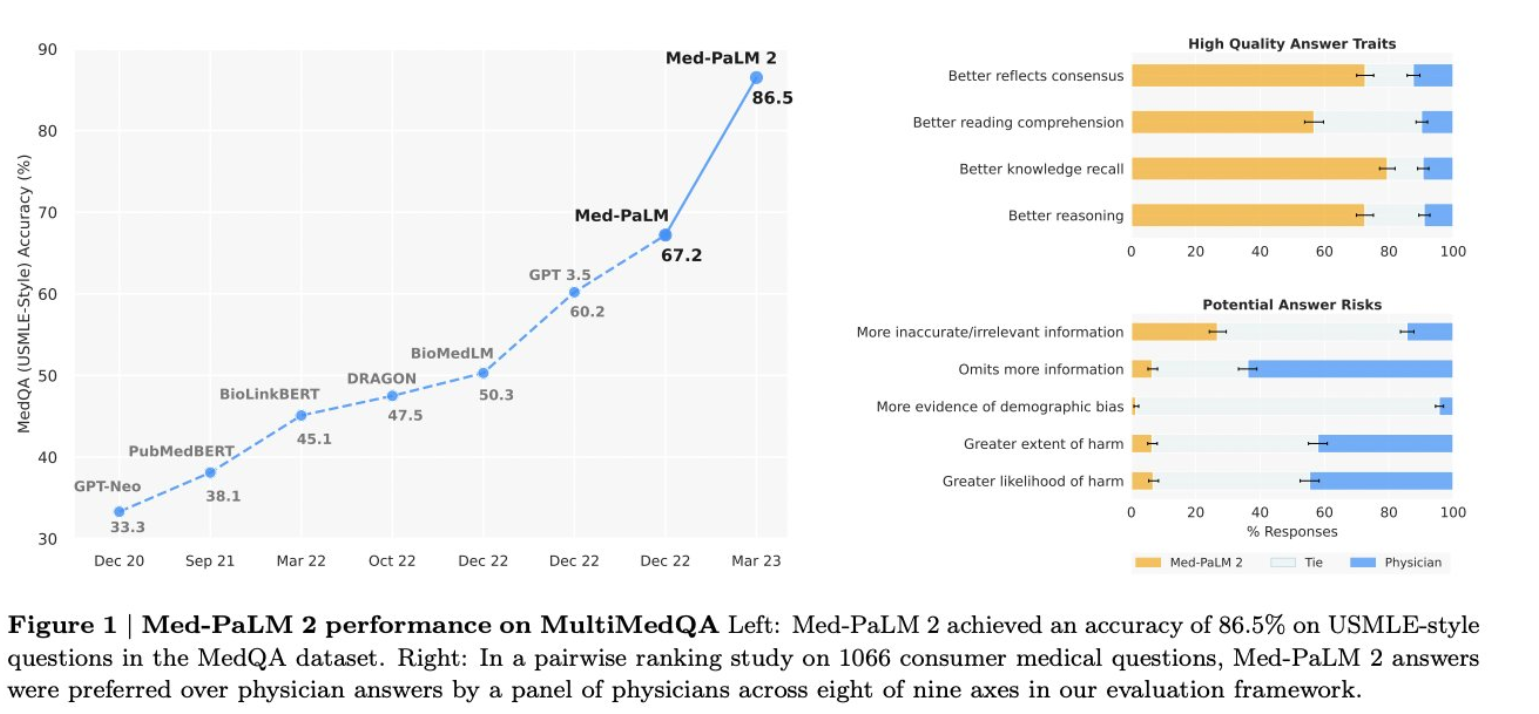
So if Google Search does incorporate Med-PaLM 2 into Google Search and allow users to get answers to common question and answers, it could result in a drastic shift in patient behavior.
Healthcare however falls under a category called ‘Your Money Your Life’, which also includes finance and civic information. Google repeatedly emphasizes its responsible approach to AI and it is likely that the AI generated health content would be a highly regulated category. In their paper- A new way to search with generative AI: An overview of SGE, Google states “We’ve also trained the model to include disclaimers in its output, where appropriate. For example, on health-related queries where we do show a response, the disclaimer emphasizes that people should not rely on the information for medical advice, and they should work with medical professionals for individualized care.“
Today’s AI models are prone to bias and are also known to hallucinate (make up answers). Given the legal implications, it can be expected that Google takes a very cautious approach in this regard, in spite of the fact that MedPaLM2 is a state of the art model and has produced spectacular results.
Your Brand Is Key For Google SGE
The AI powered SGE, flips the traditional concept of search on its head. Google made its name with the super fast high quality search – returning a great set of links at lightning speed. With SGE, Google brings you all the information within Google Search itself. In many cases this means that patients who are just looking for information, will never visit your website. Google does state that ‘As we bring generative AI into Search, we’re committed to continue sending valuable traffic to sites across the web’, but it remains to be seen how this pans out in reality.
The Google SGE demo however laid a great deal of emphasis on the concept of Perspectives and was strikingly visual compared to today’s Google. The power of your brand therefore becomes really important, as this maximises your visibility within SGE.
Takeaways for Healthcare Businesses
So as a healthcare business, how can you start preparing for SGE? The new AI infused SGE will first be rolled out to test users in the USA and over the course of an year is expected to replace the traditional search experience for users across the globe. So this gives you time to prepare for these upcoming changes. Here are some suggested steps that would help your healthcare business prepare for SGE.
- Strengthen Your Web Presence: Having a well-designed, user friendly and information rich web presence is now more important than ever. Since SGE allows users to find answers to literally any question, the businesses which present all the necessary information stand a better chance of being featured in the SGE results.
- Pay Attention To Visuals: SGE is very visual compared to existing search engines. You therefore need to ensure that your business website takes advantage of this and ensures that your brand gets noticed.
- Manage Your Online Reputation: Patient reviews – both textual and video reviews are an important part of SGE. It is important for healthcare businesses to manage their online reputation. Consider using reputation management software that helps you engage with patients and gather reviews as part of a standardized process.
- Convenience Features: It is more important than ever to now prioritize patient convenience and make available features like appointment booking, payments, patient health data access, mobile apps etc on your website. This will help your business standout and gives patients a reason to visit your website.
Summary
The unparalleled success of ChatGPT, has set off a fast paced AI race among the major technology companies. AI is now being infused into most software applications. Google, who was initially caught off guard by the rapid adoption of ChatGPT, made its presence felt at the recently concluded Google I/O 2023 where it showcased AI as being core to its entire technology offering. Google Search with 92% of the market is getting the biggest makeover since its inception with Google SGE. Google SGE replaces the traditional website links with a number of AI powered features including Generative AI Snapshots, Perspectives, Conversations and a number of other AI powered enhancements. The new Google Search is expected to answer long tail queries and helps patients find answers within the Google Search interface.
The AI takeover of Google Search will have a significant impact for healthcare businesses, who will need to strengthen their online presence and brand and prioritize the availability of patient convenience features to stand out in this new AI powered online SGE interface.
AI is progressing at a tremendous pace and the current PaLM-2 model will be replaced with Google Gemini – a new model with much advanced capabilities. Google Search can be expected to advance rapidly and it is imperative that healthcare businesses adapt to keep up with these changes.
